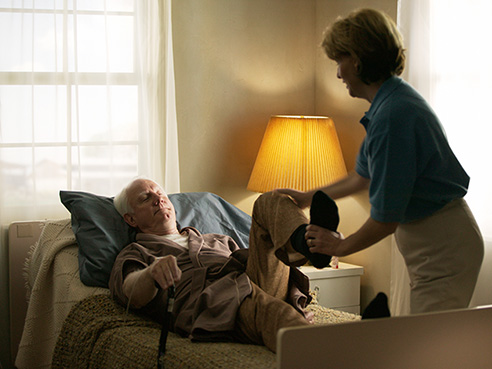 Two papers recently published by University of Alabama at Birmingham School of Nursing researchers in the Journal of Clinical Oncology highlight the need for a “culture shift” by clinicians and the general public to engage palliative care services long before a person reaches the final stage of life.
Two papers recently published by University of Alabama at Birmingham School of Nursing researchers in the Journal of Clinical Oncology highlight the need for a “culture shift” by clinicians and the general public to engage palliative care services long before a person reaches the final stage of life.
Two articles reporting on 207 advanced cancer patients and 122 of their family caregivers who participated in the ENABLE III Trial (“Early Versus Delayed Initiation of Concurrent Palliative Oncology Care” and “Benefits of Early Versus Delayed Palliative Care to Informal Family Caregivers of Patients With Advanced Cancer”) reveal that palliative care delivered soon after a diagnosis of advanced cancer had statistically beneficial effects on patient survival and family caregiver depression and burden when compared with care provided 12 weeks later. The one-year survival rate for patients was 63 percent for those who received early palliative care, compared with 48 percent in the group whose care was delayed. These results support integration of palliative care for patients and families as soon as possible after diagnosis.
“Palliative care is about providing an extra layer of support so that patients can live well and families can be supported,” said principal investigator Marie Bakitas, D.N.Sc., professor and Marie L. O’Koren Endowed Chair in the School of Nursing. “These data support the importance of providing this care at the same time as medical treatments aimed at fully curing disease. Too often, that is not the case.”
“If patients and clinicians wait to introduce palliative care when a person is actively dying, it limits the full range of services that patients and their families can receive,” said Nick Dionne-Odom, Ph.D., postdoctoral fellow in the School of Nursing and lead author of the family caregiver ENABLE Trial outcomes. “This means palliative care is mistakenly associated solely with end-of-life care. This is unfortunate. Our research shows that integration of palliative care earlier in the cancer trajectory benefits both patients and their family caregivers.”
| “These data support the importance of providing this care at the same time as medical treatments aimed at fully curing disease. Too often, that is not the case.” |
The investigators say that family caregivers who receive this support and education have greater capacity and skills to deliver high-quality support to patients. Likewise, providing patients with palliative care early eases the burden on families, who deliver the majority of care and psychosocial support in the home.
“Anyone who has been through cancer with a family member can attest to the physical, psychological and existential burden it places on both parties,” Dionne-Odom said. “Receiving this extra layer of support early and at the same time as curative medical treatments is vital for helping patients and their family caregivers develop the coping and other skills needed for the ups and downs of their journey.”
Bakitas says two other shifts in the view of palliative care also are needed.
“Reimbursement mechanisms need to incentivize this care to be offered regardless of six-month prognosis, which is the current hospice-benefit requirement,” Bakitas said. “Also, increased clinician education is needed to train both specialists and general practitioners in palliative care.”
Both researchers say mechanisms still need to be identified that explain the effects of early palliative care, and they are looking at the impact of depression and biological mechanisms that might contribute to this explanation.
Bakitas recently was awarded a five-year, $3.5 million National Institute of Nursing Research R01 grant to study whether palliative care provided to advanced heart-failure patients while they are well results in a better quality of life, improved mood, and less symptom distress/burden for patients and/or caregivers when compared to usual heart-failure care. It will test this similar intervention using materials and an approach adapted from the ENABLE cancer intervention.